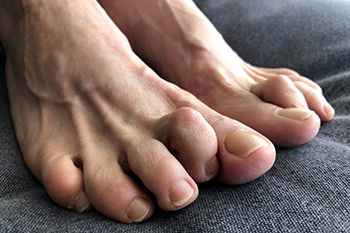
Hammertoe is an ailment that affects the toes in the feet. Specifically, the second, third or fourth toes are targeted with this condition and this can happen due to genetics. Patients who have this ailment notice their toes bend downward, and can resemble a hammer. It may also develop from wearing shoes that do not have ample room for the toes to move freely in. This may cause a muscle imbalance, and common symptoms can include swelling and pain, and it can be difficult to walk. This condition develops gradually, and the toes are flexible when first noticed. Prompt medical treatment is necessary to prevent the toes from becoming rigid, because at that point treatment may be difficult. Patients can find mild relief when different shoes are worn, preferably with a low heel and plenty of room that can accommodate the toes. This can be followed by practicing specific exercises that can strengthen the toes. If you have developed hammertoe, it is suggested that you speak with a podiatrist who can guide you toward the treatment method that is right for you.
Hammertoe
Hammertoes can be a painful condition to live with. For more information, contact Howard Abramsohn, DPM from Ambulatory Foot and Ankle Associates, LLC. Our doctor will answer any of your foot- and ankle-related questions.
Hammertoe is a foot deformity that affects the joints of the second, third, fourth, or fifth toes of your feet. It is a painful foot condition in which these toes curl and arch up, which can often lead to pain when wearing footwear.
Symptoms
- Pain in the affected toes
- Development of corns or calluses due to friction
- Inflammation
- Redness
- Contracture of the toes
Causes
Genetics – People who are genetically predisposed to hammertoe are often more susceptible
Arthritis – Because arthritis affects the joints in your toes, further deformities stemming from arthritis can occur
Trauma – Direct trauma to the toes could potentially lead to hammertoe
Ill-fitting shoes – Undue pressure on the front of the toes from ill-fitting shoes can potentially lead to the development of hammertoe
Treatment
Orthotics – Custom made inserts can be used to help relieve pressure placed on the toes and therefore relieve some of the pain associated with it
Medications – Oral medications such as anti-inflammatories or NSAIDs could be used to treat the pain and inflammation hammertoes causes. Injections of corticosteroids are also sometimes used
Surgery – In more severe cases where the hammertoes have become more rigid, foot surgery is a potential option
If you have any questions please contact our office located in Mt Laurel Township, NJ . We offer the newest diagnostic and treatment technologies for all your foot and ankle needs.
